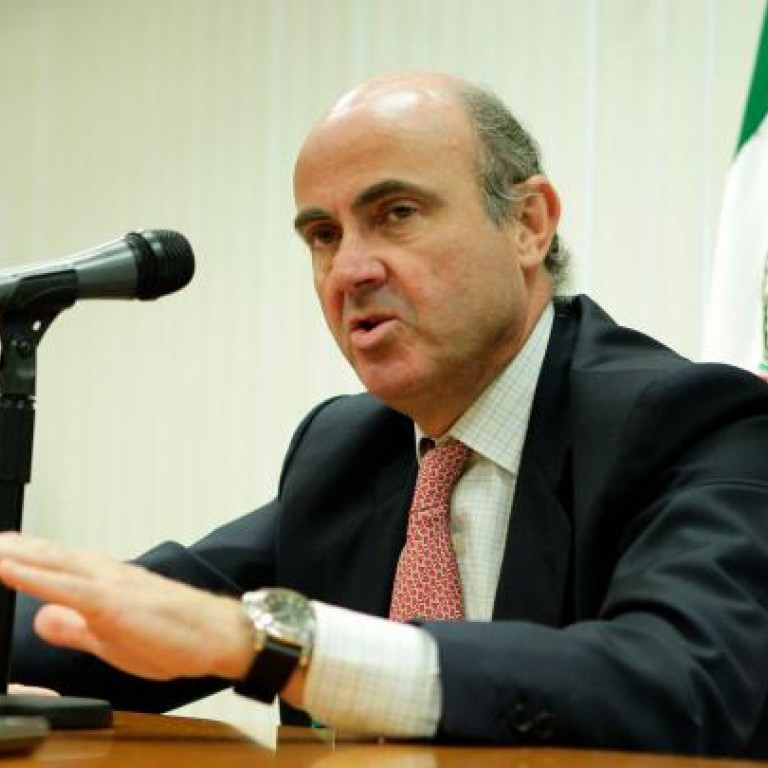
G20 presses Europe, US to fix fiscal challenges
The world’s leading economies pressed the United States and Europe to swiftly resolve their fiscal challenges on Monday, warning that they threaten to harm global growth.
Finance ministers and central bankers from the Group of 20 leading developed and emerging nations vowed to do “everything necessary” to strengthen the world economy, reduce volatility in financial markets and generate jobs.
The two-day talks in Mexico City focused on the eurozone’s relentless debt crisis and the United States’ looming “fiscal cliff” -- a set of automatic spending cuts and tax hikes in January that could impact global growth.
“Global growth remains modest and downside risks are still elevated,” the G20 said in a final communique.
The statement cited “possible delays in the complex implementation of recent policy announcements in Europe” and a “potential sharp fiscal tightening in the United States.”
But the finance chiefs also voiced concern over Japan’s own fiscal troubles as well as slowing growth in emerging nations and “additional supply shocks” in some commodity markets.
G20 officials acknowledged that any resolution to the fiscal cliff will have to wait until after Tuesday’s US presidential election, with incumbent Barack Obama facing a tight race with Republican rival Mitt Romney.
The White House and Congress must reach a compromise by the end of the year of avoid the cliff.
“The United States will carefully calibrate the pace of fiscal tightening to ensure that public finances are placed on a sustainable long-run path while avoiding a sharp fiscal contraction next year,” the G20 statement said.
Spanish Economy Minister Luis de Guindos warned that the US fiscal cliff hung over the world like a “sword of Damocles.”
“What happens tomorrow in the presidential and legislative elections in the United States will be crucial,” he said. “For this reason the US delegation could not be very categorical.”
US Treasury Secretary Timothy Geithner sent a deputy to the G20 talks, as did other key G20 policymakers, including European Central Bank president Mario Draghi and the finance ministers of France and Brazil.
Since a G20 summit in June, the IMF slashed its this year global growth forecast to 3.3 per cent, eurozone unemployment rose to a record 11.6 per cent in September and growth decelerated in emerging nations.
Under pressure to act, the eurozone has since moved closer to a banking union and activated a 500-billion-euro ($650 billion) crisis firewall, while the European Central Bank unveiled a bond-buying program.
While G20 nations “recognise” the progress made in Europe, “there is also impatience and a strong demand for all of this to be put in place in an effective and concrete way,” a senior G20 official said.
Greece faces key deadlines to avoid bankruptcy this month while Spain is under pressure to seek a bailout of its own amid a recession that has pushed the unemployment rate to 25 per cent.
De Guindos outlined his country’s banking and labour reforms to G20 counterparts at a dinner Sunday night.
But he told reporters Monday that his country does not need a rescue from European partners for now.
“The Spanish treasury is well financed this year,” he said. “We have almost closed our financing needs for this year. We have a relatively comfortable liquidity situation.”
Greece, meanwhile, has been negotiating with the European Union, the International Monetary Fund and the European Central Bank to unlock a 31.5 billion euro tranche of a bailout package or risk bankruptcy this month.
The Greek parliament will hold crucial votes this week on a new round of austerity demanded by international lenders. But Greece also wants a two-year delay to implement its fiscal obligations, an issue that divides Europeans.
A European official downplayed expectations of a formal decision on Greece at a November 12 meeting of finance ministers, saying that the financing debate must be resolved first.
